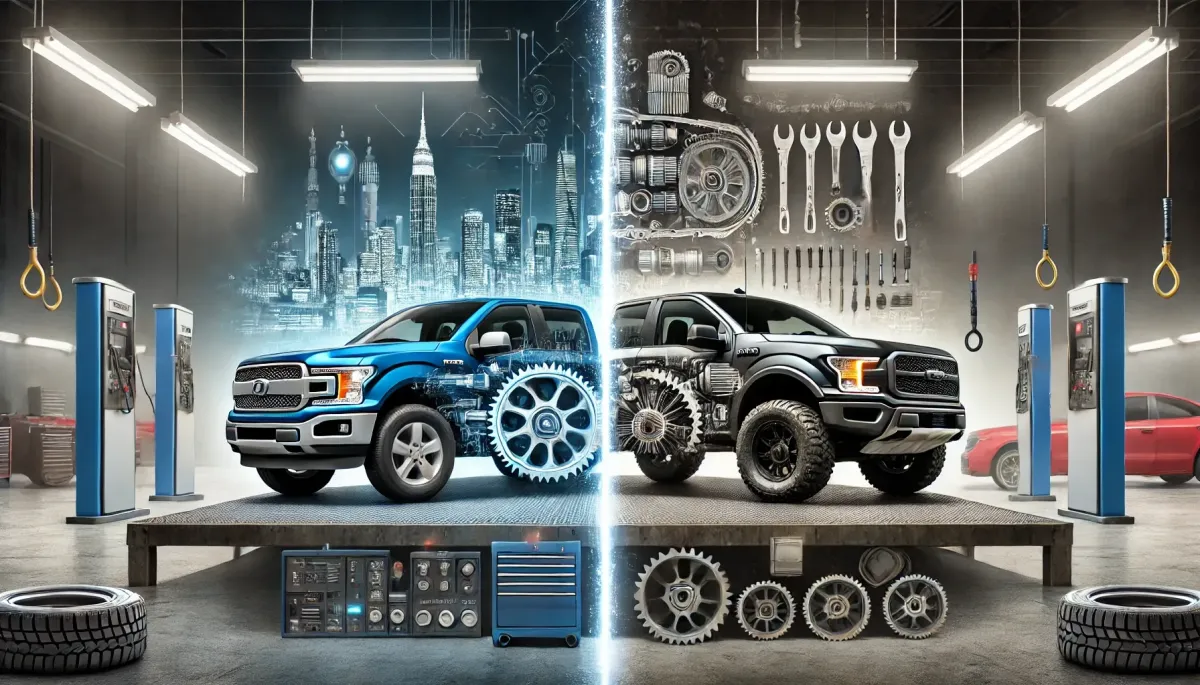
Automatic vs. Manual Transmissions: Performance, Maintenance, and Personal Preferences
Automatic vs. Manual Transmissions: Performance, Maintenance, and Personal Preferences
The choice between an automatic and a manual transmission is one of the most significant decisions pickup truck owners face. This decision affects driving experience, maintenance, performance, and even fuel efficiency. Understanding the nuances of both types can help you make an informed choice that aligns with your driving style and needs. Imagine driving a truck that perfectly suits your preferences, whether you crave the control of a manual or the convenience of an automatic. This chapter explores the differences between automatic and manual transmissions, helping you decide which is best for your pickup truck.
Key Points:
Understanding Automatic and Manual Transmissions:
How Each Type Works
Key Components and Mechanisms
Common Applications in Pickup Trucks
Performance Comparison:
Acceleration and Power Delivery
Fuel Efficiency Differences
Off-Road and Towing Capabilities
Maintenance and Longevity:
Routine Maintenance Requirements
Common Issues and Repairs
Cost of Ownership Over Time
Driving Experience and Preferences:
Control and Engagement with Manual Transmissions
Convenience and Ease of Use with Automatic Transmissions
Situational Benefits and Drawbacks
Making the Decision:
Assessing Your Driving Style and Needs
Considering Long-Term Ownership and Resale Value
Test Driving and Personal Preferences
Real-World Examples:
Understanding Transmissions:
Jake chose a manual transmission for his off-road adventures, valuing the precise control over gear changes.
Sarah opted for an automatic transmission for her daily commutes, appreciating the ease of use in heavy traffic.
Performance:
Tom found that his manual transmission provided better acceleration and power when towing heavy loads.
Emily experienced improved fuel efficiency with her automatic transmission during long highway drives.
Maintenance:
Frank noticed that his manual transmission required less frequent and less costly maintenance compared to an automatic.
Lisa faced a costly repair when her automatic transmission's electronic control unit failed.
Driving Experience:
John enjoyed the engaging driving experience of his manual transmission, especially on winding roads.
Rachel preferred the convenience of her automatic transmission for city driving and long-distance trips.
Decision-Making:
Mike assessed his need for towing and chose a manual transmission for its durability and performance.
Karen test-drove both types and chose an automatic for its smooth shifts and ease of use.
In-Depth Analysis:
Understanding Automatic and Manual Transmissions:
Manual Transmissions: Operated by manually engaging and disengaging the clutch and shifting gears using a gear stick. Offers direct control over gear changes.
Automatic Transmissions: Use a torque converter and a complex system of gears and clutches to automatically shift gears based on speed and load.
Performance Comparison:
Acceleration and Power: Manual transmissions often provide better acceleration and direct power delivery due to the driver’s control over gear changes.
Fuel Efficiency: Manuals can offer better fuel economy, but modern automatics with advanced technology are closing the gap.
Off-Road and Towing: Manuals typically handle off-road conditions and heavy towing better due to their durability and control.
Maintenance and Longevity:
Routine Maintenance: Manuals require clutch replacements, while automatics need regular fluid changes and may face electronic issues.
Common Issues: Automatics are prone to electronic failures and complex repairs, whereas manuals often face simpler, mechanical issues.
Cost of Ownership: Manuals generally have lower long-term maintenance costs, but modern automatics with fewer issues can also be economical.
Driving Experience and Preferences:
Control: Manual transmissions offer more control and engagement, preferred by drivers who enjoy an interactive driving experience.
Convenience: Automatics are easier to drive, particularly in heavy traffic and for long distances, reducing driver fatigue.
Situational Benefits: Manuals excel in off-road and towing scenarios, while automatics are advantageous for urban driving and multi-tasking.
Making the Decision:
Assess Needs: Consider your primary use cases, such as commuting, off-roading, or towing.
Long-Term Ownership: Think about the long-term costs and potential resale value of the truck.
Test Drives: Spend time driving both types to understand their feel and performance in real-world conditions.
Practical Applications:
Decision-Making Guide:
Identify Needs: Determine your primary driving conditions and requirements.
Evaluate Costs: Compare the maintenance and long-term ownership costs of both transmission types.
Test Drives: Drive trucks with both manual and automatic transmissions to gauge comfort and performance.
Tool Recommendations:
Diagnostic Scanner: Useful for monitoring automatic transmissions and identifying potential issues.
Clutch Alignment Tool: Essential for DIY maintenance on manual transmissions.
Transmission Fluid Pump: Helpful for changing transmission fluid in automatics.
Tips and Tricks:
Stay Open-Minded: Consider both options even if you have a strong initial preference.
Consult Experts: Seek advice from mechanics and experienced truck owners to get practical insights.
Long-Term View: Think about how your driving needs might change over time and choose accordingly.
Conclusion:
Choosing between an automatic and a manual transmission for your pickup truck involves weighing performance, maintenance, and personal preferences. By understanding the strengths and weaknesses of each type, assessing your specific needs, and consulting with experts, you can make an informed decision that enhances your driving experience and meets your long-term goals. Regular maintenance and mindful driving will ensure your chosen transmission performs optimally for years to come.
Call to Action:
Do you prefer manual or automatic transmissions for your pickup truck? Share your experiences, preferences, and advice in the comments below. Let’s help each other make informed decisions and enjoy the best driving experience possible. Your insights could be invaluable to fellow truck owners facing the same choice!
Ready to experience the TTS difference?
Visit prebuilttrans.com to learn more about our services or to schedule an appointment or call +1 385-462-8458 for more info! We're dedicated to keeping your pick-up truck running in tip-top shape!
Disclaimer: This blog post is intended for informational purposes only and should not be interpreted as professional advice. Always consult with a qualified mechanic or transmission specialist for specific recommendations regarding your vehicle.
© 2024 Truck Transmission Specialists. All rights reserved.
Get In Touch
FAQS
How quickly can I expect to have My truck back on the road?
At TTS, we prioritize fast and efficient repairs because we understand that downtime means lost business. With our comprehensive inventory of parts, there’s no waiting for shipments or delays from lengthy rebuilds. You can order the needed parts from our online shop, set a date, and we’ll ensure your truck is back on the road promptly. No fuss, no backorders, just efficient service to keep your wheels turning.
What types of vehicles do you provide transmission service for?
We specialize in prebuilt transmissions for domestic U.S. trucks, focusing primarily on Dodge, Ford, Chevy, and GMC brands. Our inventory ensures quick availability and installation, minimizing downtime for your vehicle. If you have any questions or need further assistance, feel free to chat with us online or give us a call. We’re here to help you get back on the road swiftly and efficiently.
Is roadside assistance or towing available?
Yes, we offer free towing for vehicles within a 50-mile radius of our Orem location and special rates for longer distances. If you need assistance after hours, please leave a message, text us, or use our site chat bot to provide your contact information. Someone will reach out to you as quickly as possible to arrange pick-up. Feel free to call us for any additional information or assistance.
What types of services does TTS Emergency Road Service offer?
TTS Emergency Road Service provides a wide range of services to ensure you are covered for any situation. Our offerings include:
Transmission Replacement
Transmission Upgrades
Transmission Repair
Towing services
Fleet maintenance inspections
Each service is designed to get you back on the road as quickly and safely as possible. Whether you have a transmission down or need a comprehensive inspection for your fleet, we've got you covered.


